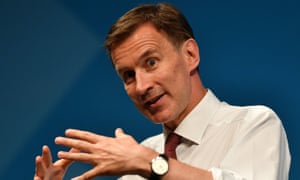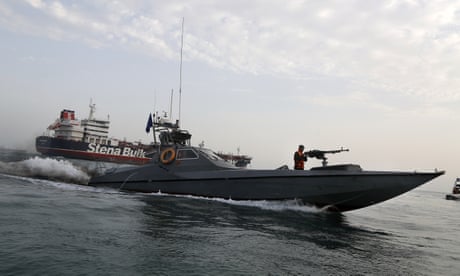Patrick Wintour
 Henry Kissinger, the former US diplomat and occasional adviser to the UK foreign secretary, once wrote: “Policy is the art of the possible, the science of the relative.”
Henry Kissinger, the former US diplomat and occasional adviser to the UK foreign secretary, once wrote: “Policy is the art of the possible, the science of the relative.”
As the Foreign Office surveys the wreckage of its relations with Iran, even the possible seems unavailable to British diplomacy. There are few if any good options as Britain finds its alliances and strengths tested in a new dangerous context.
Jeremy Hunt awaits a new prime minister, with a lingering hope in his heart it may yet be him but knowing in his head it will most likely be Boris Johnson, an unpredictable man with an instinct to favour the US over Europe. The foreign secretary has only the lukewarm support of Europe, not over the capture of the British-flagged oil tanker Stena Impero, for which there is solidarity, but for the UK’s original decision to seize the Iranian-flagged Grace 1 in Gibraltar. That action directly led to the Stena Impero being taken under the control of Iran’s Revolutionary Guards.
Even the former British ambassador to Washington, Sir Peter Westmacott, has questioned the wisdom of seizing the ship in what looks like a belated bid to undermine President Bashar al-Assad, a man the UK has acknowledged will remain in power at the end of the Syrian civil war. Disregarding the legality of detaining Grace 1, which is a point of dispute, the Royal Marines landing on the vessel was the equivalent of putting a lighted match into a kerosene-laden tinderbox.
Play Video
2:16 'If you obey, you will be safe': UK-Iran radio exchange over seized tanker released – audio
Hunt also has the unreliable support of an American president whose intentions towards Iran are entirely different to those of the UK and whose actions over the past years have amounted to diplomatic vandalism, according to the outgoing UK ambassador to Washington, Sir Kim Darroch.

UK defence minister rejects criticism over tanker seized in Gulf
Due to decades of defence cuts, something the foreign secretary abhors, Hunt does not truly have the ability to act as the representative of an independent naval power, yet he also fears how the US would lead a maritime security operation in the Gulf. No one quite knows what the terms of engagement might be. The US for instance has declared the Revolutionary Guards as a terrorist organisation, something Europe has not done.
Trump has probably shown by calling off an attack last month that he does not have the instinct for war with Tehran, but there are those around him who do. The former UK foreign secretary Jack Straw’s description of John Bolton as “off the wall” when it comes to Iran is likely to be shared by those in the Foreign Office.
In the daily skirmishes for Trump’s ear, you can rarely predict who will win. Bolton modestly claims he is only the president’s national security adviser and not decision-maker, but every day is different in the White House.
So in this confined space Britain, even now, probably wants to find a way to de-escalate the crisis. Some limited sanctions aimed at individuals in the Revolutionary Guards are inevitable. They will not at this stage represent a return to the kind of sanctions that existed before the 2015 joint comprehensive plan of action (JCPA) known as the Iran deal. Britain’s outgoing chancellor, Philip Hammond, admitted as much on BBC One’s The Andrew Marr Show.
Negotiations – hampered by the legalities – will commence over the release of Grace 1 from Gibraltar and could end up in the UK high court.
But the British insist there is no moral equivalence between the two incidents. Hunt says Grace 1 was lawfully seized to enforce EU sanctions and even now the Iranians refuse to give an undertaking that if released it will not recommence heading for Syria. Stena Impero by contrast was captured unlawfully carrying out legitimate business.
Efforts will be stepped up to protect British merchant shipping in the Gulf, perhaps belatedly, but the question of whether the US should lead a protection force remains unanswered. Already Atlanticists such as Iain Duncan Smith are demanding to know if a US offer of maritime assistance was rejected by the British. The UK on its own is self-evidently struggling and there is talk of providing additional support from the RAF.
There are also diplomatic deadlines ahead. The joint commission of the JCPA is due to meet shortly at political director level to discuss Iran’s suspended commitments to the nuclear deal, including its enriching of uranium beyond agreed levels. So far Britain, France and Germany have admonished Iran for these breaches, but said last Monday they did not yet warrant triggering the agreement’s formal disputes mechanism. The JCPA permits Iran to take these steps if it believes one of the signatories is not meeting its commitments under the agreement.

Guardian Today: the headlines, the analysis, the debate - sent direct to you
On the other side of the ledger, the EU could increase the credibility of Instex, the barter mechanism established by the bloc to help humanitarian trade between Europe and Iran in a way that might circumvent US secondary sanctions. But this is largely a sticking plaster. The big strategic decision, and this awaits the new prime minister, is whether to believe the JCPA can be salvaged.
It looks like Europe can keep the JCPA on life support for only a little longer, with the pressure coming from the US proving too great.
The major task for the new prime minister will be to sit down with Trump and urge him to clarify what he is trying to achieve in Iran: constraints on its nuclear ambitions or its regional submission. Trump needs a more credible explanation of what success looks like.
Advice is the traditional British role. A Foreign Office memorandum from 1944 cited this weekend by David Reynolds, a Cambridge University professor of international history, read: “It must be our purpose to make use of American power for purposes we regard as good,” adding that “if we go about our business in the right way we can help steer this great unwieldy barge, the United States of America, into the right harbour”.
With the ships firmly moored in the wrong harbour, manoeuvring the barge towards safety would be no mean achievement.
More people in India…
... like you, are reading and supporting The Guardian’s independent, investigative journalism than ever before. And unlike many new organisations, we have chosen an approach that allows us to keep our journalism accessible to all, regardless of where they live or what they can afford. But we need your ongoing support to keep working as we do.
The Guardian will engage with the most critical issues of our time – from the escalating climate catastrophe to widespread inequality to the influence of big tech on our lives. At a time when factual information is a necessity, we believe that each of us, around the world, deserves access to accurate reporting with integrity at its heart.
Our editorial independence means we set our own agenda and voice our own opinions. Guardian journalism is free from commercial and political bias and not influenced by billionaire owners or shareholders. This means we can give a voice to those less heard, explore where others turn away, and rigorously challenge those in power.
No comments:
Post a Comment